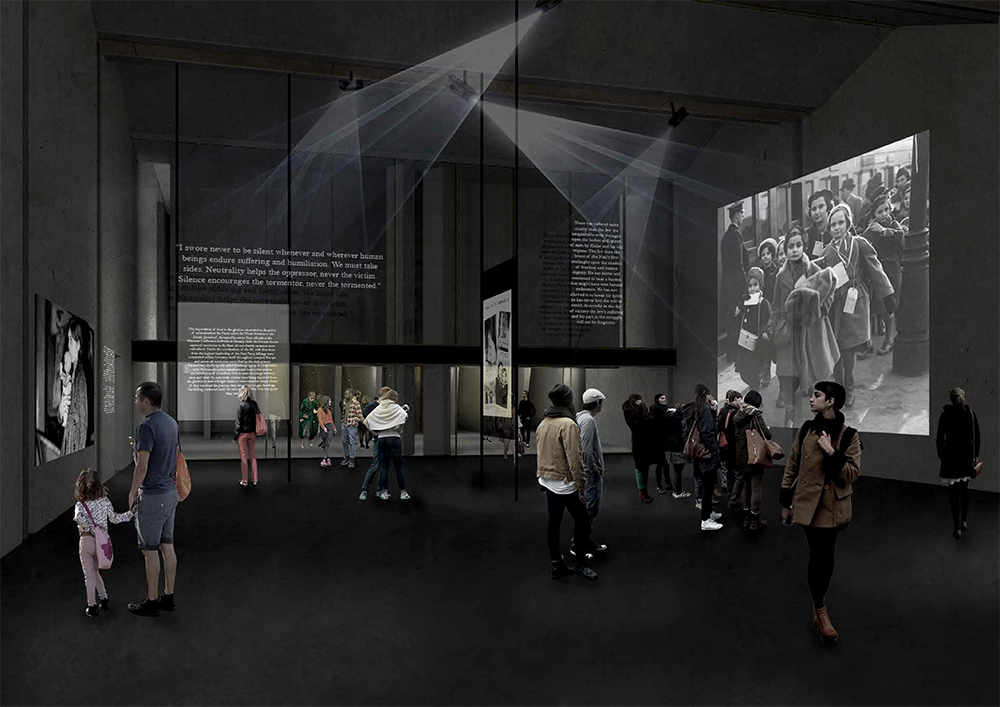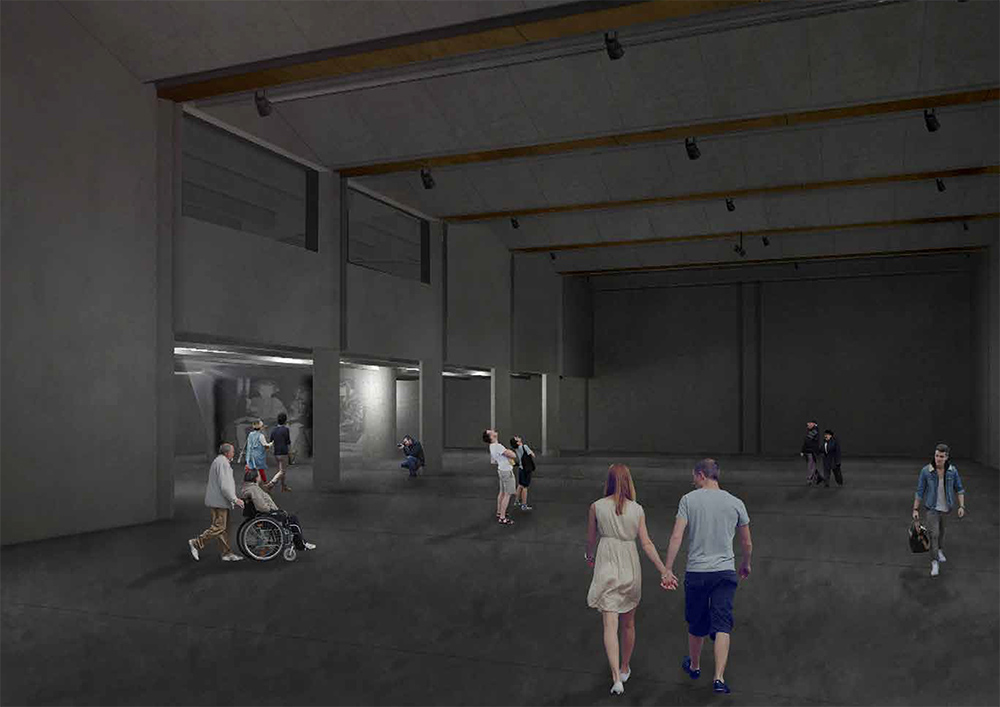About
The Holocaust – a British Perspective: Confronting Evil, Assuming Responsibility
About
The Holocaust – a British Perspective: Confronting Evil, Assuming Responsibility
The Holocaust Memorial will have national and international significance and will stand as a reminder that in a democracy we share responsibilities to encourage tolerance for ethnic, religious and racial differences and foster religious freedom, individual rights and civil responsibility.
It will deliver on a promise made by the UK Government at a time when national and global challenges are placing unprecedented pressures on our democratic frameworks and amid a rise in antisemitism, the need for the centre could not be greater.
As each year passes, we see the loss of witnesses to the Holocaust, making the establishing of the UK’s national memorial ever more urgent.
The Holocaust Memorial will have national and international significance and will stand as a reminder that in a democracy we share responsibilities to encourage tolerance for ethnic, religious and racial differences and foster religious freedom, individual rights and civil responsibility.
It will deliver on a promise made by the UK Government at a time when national and global challenges are placing unprecedented pressures on our democratic frameworks and amid a rise in antisemitism, the need for the centre could not be greater.
As each year passes, we see the loss of witnesses to the Holocaust, making the establishing of the UK’s national memorial ever more urgent.
Its place in the world
It will fill a need for a prominent national Holocaust memorial and will provide a unique and powerful experience, for visitors from across the UK and around the world and delivers Britain’s promise. The historical, emotional and political significance of its location in Victoria Tower Gardens next to Parliament, is a powerful symbol of our commitment to remembering the Holocaust.
Its place in the world
It will fill a need for a prominent national Holocaust memorial and will provide a unique and powerful experience, for visitors from across the UK and around the world and delivers Britain’s promise. The historical, emotional and political significance of its location in Victoria Tower Gardens next to Parliament, is a powerful symbol of our commitment to remembering the Holocaust.
The Memorial at a glance
The Memorial will stand as a reminder of the horrors of the past and will encourage reflection on their implications for British government and society, both at the time and subsequently.
The view of Parliament from the Memorial will serve as a permanent reminder that political decisions have far-reaching consequences. The Holocaust Memorial will sit well with existing memorials in the gardens representing democratic struggles for equality and justice. The Memorial will give the existing memorials more visibility and relevance by creating a garden of conscience next to Parliament.
The Learning Centre will explore the role of Britain’s Parliament and democratic institutions – what Britain did and what more we could have done to tackle the persecution of the Jewish people and other groups. The structure itself will tell the story: from its shape and the volume concealed underground, to the materials used, everything has a powerful role to play.
The exhibition will be set within the British narrative: historically, politically and culturally. This narrative will be balanced, addressing the complexities of Britain’s ambiguous responses to the Holocaust, and encouraging visitors to critically reflect on whether more could have been done, both by policymakers and by society as a whole. Our aim is to combine a striking architectural monument with an engaging, reflective and powerful exhibition. The display will confront the immense human calamity caused by the destruction of Europe’s Jewish communities during the Holocaust, prompting a sincere commitment to mourn, remember and act. Victims will be remembered as individuals, not nameless statistics.
The Memorial at a glance
The Memorial will stand as a reminder of the horrors of the past and will encourage reflection on their implications for British government and society, both at the time and subsequently.
The view of Parliament from the Memorial will serve as a permanent reminder that political decisions have far-reaching consequences. The Holocaust Memorial will sit well with existing memorials in the gardens representing democratic struggles for equality and justice. The Memorial will give the existing memorials more visibility and relevance by creating a garden of conscience next to Parliament.
The Learning Centre will explore the role of Britain’s Parliament and democratic institutions – what Britain did and what more we could have done to tackle the persecution of the Jewish people and other groups. The structure itself will tell the story: from its shape and the volume concealed underground, to the materials used, everything has a powerful role to play.
The exhibition will be set within the British narrative: historically, politically and culturally. This narrative will be balanced, addressing the complexities of Britain’s ambiguous responses to the Holocaust, and encouraging visitors to critically reflect on whether more could have been done, both by policymakers and by society as a whole. Our aim is to combine a striking architectural monument with an engaging, reflective and powerful exhibition. The display will confront the immense human calamity caused by the destruction of Europe’s Jewish communities during the Holocaust, prompting a sincere commitment to mourn, remember and act. Victims will be remembered as individuals, not nameless statistics.


The Foundation stones
Make a personal contribution to the new UK Holocaust Memorial and Learning Centre by taking part in Foundation Stones.
Foundation Stones invites you to paint a stone in remembrance of the six million Jewish men, women and children murdered in the Holocaust and all other victims of Nazi persecution. You can also choose to dedicate your stone to those murdered in subsequent genocides in Cambodia, Rwanda, Bosnia and Darfur.
Building on the Jewish custom of placing a pebble on headstones when visiting a grave, Foundation Stones from across the United Kingdom will become part of the new memorial, each one a commitment to remember and learn from the past.
About the Foundation Stones
Make a personal contribution to the new UK Holocaust Memorial and Learning Centre by taking part in Foundation Stones.
Foundation Stones invites you to paint a stone in remembrance of the six million Jewish men, women and children murdered in the Holocaust and all other victims of Nazi persecution. You can also choose to dedicate your stone to those murdered in subsequent genocides in Cambodia, Rwanda, Bosnia and Darfur.
Building on the Jewish custom of placing a pebble on headstones when visiting a grave, Foundation Stones from across the United Kingdom will become part of the new memorial, each one a commitment to remember and learn from the past.
About the Holocaust Memorial Charitable Trust
The Holocaust Memorial Charitable Trust’s primary activity is to support (by grant-funding) the establishment and subsequent operation of the new UK Holocaust Memorial and Learning Centre to be built in Victoria Tower Gardens, London, adjacent to the Houses of Parliament.
The charity’s activities involve remembering and developing learning on the Holocaust and the historical context in which it occurred.
The ukholocaustmemorial.com and its content are owned by the Holocaust Memorial Charitable Trust.
Our trustees include:
The Rt Hon. the Lord Feldman of Elstree
The Rt Hon. the Baroness Taylor of Bolton
The Rt Hon. the Lord Pickles
Peter Freeman
Gerald Ronson CBE
The Lord Polak CBE
Sir Lloyd Dorfman
Edward Balls
Natasha Kaplinsky
The Rt Hon. the Baroness Smith of Basildon
The Rt Hon. the Lord Young of Graffham CH DL
About the Holocaust Memorial Charitable Trust
The Holocaust Memorial Charitable Trust’s primary activity is to support (by grant-funding) the establishment and subsequent operation of the new UK Holocaust Memorial and Learning Centre to be built in Victoria Tower Gardens, London, adjacent to the Houses of Parliament.
The charity’s activities involve remembering and developing learning on the Holocaust and the historical context in which it occurred.
The ukholocaustmemorial.com and its content are owned by the Holocaust Memorial Charitable Trust.
Our trustees include:
The Rt Hon. the Lord Feldman of Elstree
The Rt Hon. the Baroness Taylor of Bolton
The Rt Hon. the Lord Pickles
Peter Geoffrey Freeman
Gerald Maurice Ronson CBE
The Lord Polak CBE
Sir Lloyd Marshall Dorfman
Edward Michael Balls
Natasha Kaplinsky
The Rt Hon. the Baroness Smith of Basildon
The Rt Hon. the Lord Young of Graffham CH DL
About the UK Holocaust Memorial Foundation
The UK Holocaust Memorial Foundation was established in January 2015 to advise the Government on taking forward the recommendations of the Prime Minister’s Holocaust Commission, including to deliver a striking new National Memorial to the Holocaust in a prominent central London location, co-located with a world-class Learning Centre.
The Foundation is an expert committee whose members are appointed by the Prime Minister. Members are appointed on an independent basis to represent particular areas of expertise and experience, rather than as delegates of particular organisations or interest groups. As an expert committee to MHCLG, the Foundation has no fiduciary responsibility.
About the UK Holocaust Memorial Foundation
The UK Holocaust Memorial Foundation was established in January 2015 to advise the Government on taking forward the recommendations of the Prime Minister’s Holocaust Commission, including to deliver a striking new National Memorial to the Holocaust in a prominent central London location, co-located with a world-class Learning Centre.
The Foundation is an expert committee whose members are appointed by the Prime Minister. Members are appointed on an independent basis to represent particular areas of expertise and experience, rather than as delegates of particular organisations or interest groups. As an expert committee to MHCLG, the Foundation has no fiduciary responsibility.
